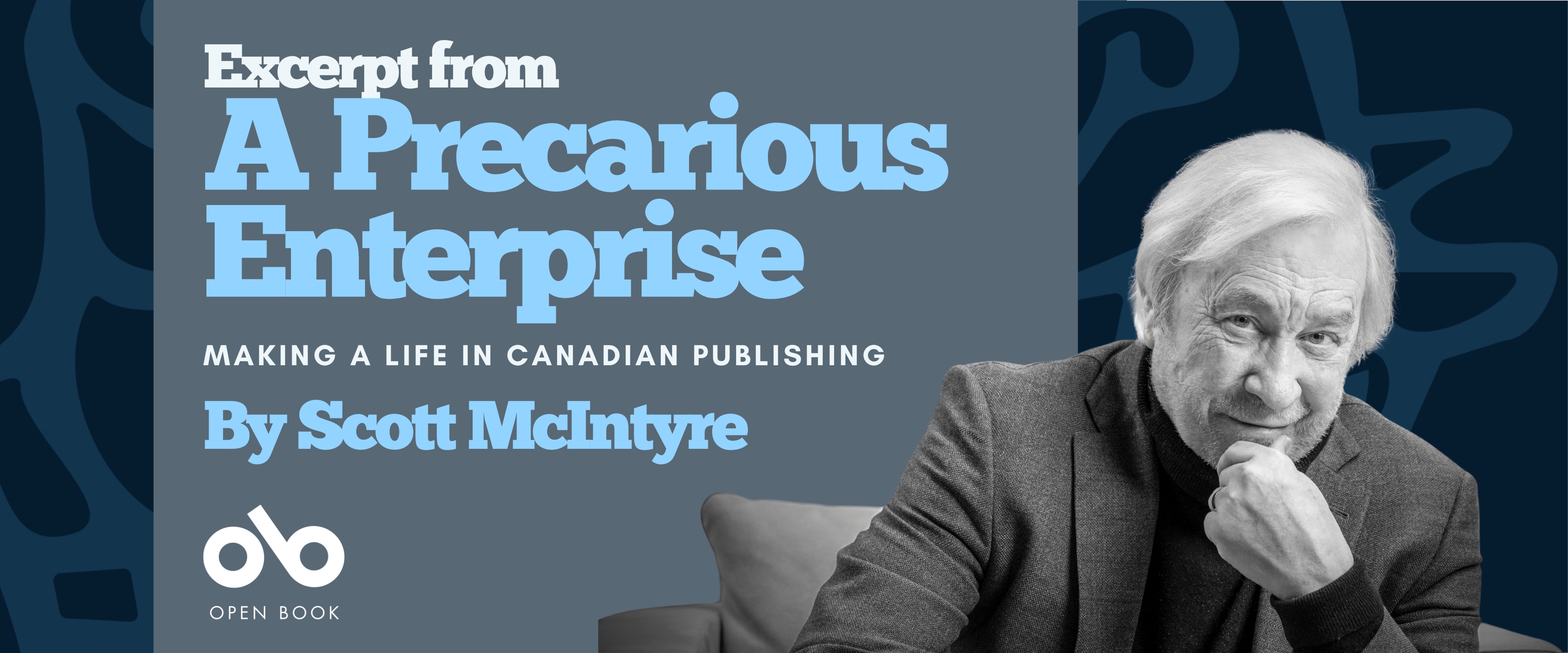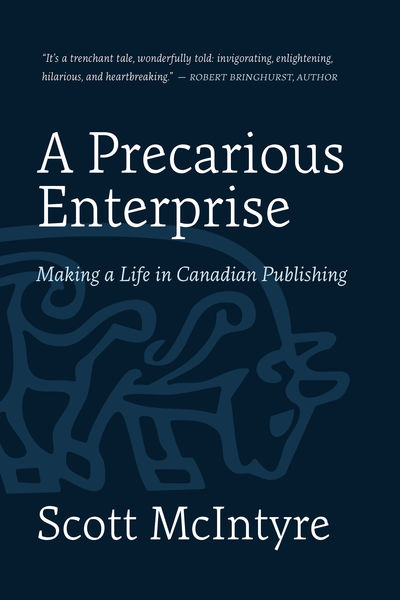Read an Excerpt from A Precarious Enterprise: Making a Life in Canadian Publishing by Scott McIntyre
Canadian publishing has always been full of fascinating characters and transformative moments, and few people know that story more intimately than Scott McIntyre. With wit, warmth, and a lifetime of experience, McIntyre opens the door to the inner workings of an industry that has shaped the way Canadians see themselves and their country with A Precarious Enterprise: Making a Life in Canadian Publishing. His new book is both a history and a celebration, alive with the energy of a literary landscape coming into its own.
McIntyre began his journey at McClelland & Stewart in the late 1960s before co-founding Douglas & McIntyre in 1970, a press that would become one of Canada’s most influential publishing houses. Over the decades, he championed more than 900 authors and 2,000 books, nurturing voices that defined generations. From the groundbreaking work of Indigenous writers to the beloved stories of household names like Farley Mowat, Wayson Choy, and Douglas Coupland, his vision shaped not just a publishing house but the cultural conversation of an entire country.
Readers will be delighted by the behind-the-scenes stories McIntyre shares about authors, editors, and the changing landscape of Canadian literature. He captures the passion and grit that built the publishing world in the postwar era and traces the traditions that continue to inspire today’s book world. With this insider’s account, McIntyre offers a lively, personal, and unforgettable portrait of Canadian publishing at its most dynamic.
We're very excited to share an excerpt from this enlightening new work of non-fiction, right here on Open Book!
An Excerpt from A Precarious Enterprise: Making a Life in Canadian Publishing by Scott McIntyre:
On the national stage, the previous year had been a game-changer for publishers. The industry had spent several years lobbying Ottawa for bolder book publishing support policy. Significant national support for publishing was rumoured to be inching forward in Ottawa. Was it a promise, or just a hope? Georges Laberge, once a Quebec City bookseller, had been seconded to what was then the secretary of state to conceptu- alize how such an initiative might work. Laberge’s proposed solution was an “industrial” program to inject fresh equity into the business. He had devised an ambitious one, in theory. It had made steady progress up the bureaucratic ladder, but had stalled at Treasury Board, bumped from the weekly agenda for several weeks. Time was not our friend.
Patsy Aldana, who had followed Jim as president of the ACP, phoned me with her usual subtlety to announce that Armageddon was imminent. Either the proposal made it through Treasury Board during the coming week, or the possibility might die. The head of the Treasury Board was Robert Andras, Allan MacDougall’s father-in-law. After Allan replaced me at McIntyre & Stanton, Corky and I had socialized with the Andrases during their family visits to Vancouver, and I much liked Robert.
Apparently, he was now our last hope. I tracked him down in Vancouver, but he was leaving to return to Ottawa on New Year’s Day. We arranged a call for that morning.
The evening before, we had dinner with old friends Crispin and Jan Elsted of Barbarian Press. Andreas “Andy” Schroeder, Sharon Brown, and Robert Bringhurst were seated around a cramped table in the Elsteds’ small house near Mission. The evening was a long-standing and much-treasured tradition that we all gather for a meal to linger over, a visit to the Barbarian presses in a separate building across the lawn, good wine, and expansive, undisciplined conversation. Our son was very young and demonstrated the good sense to fall asleep early.
Once the conversation became animated, as it always did, my tra- ditional role was to defend the virtues of Canadian publishing. Dinner was a sympathetic, if skeptical, environment for such a conversation. That night, everyone wanted to know what was going on in Ottawa. I couldn’t answer.
Your CanLit News
Subscribe to Open Book’s newsletter to get local book events, literary content, writing tips, and more in your inbox
Corky and I had another New Year’s tradition: a visit to the nearby Order of St. Clare’s Monastery to see one of our oldest friends, Claire Blondin. We had first met 10 years earlier in Leysin, Switzerland, hanging our hats in the Club Vagabond, where an unruly assortment of hikers, climbers, and wanderers wasted time. Lasting friendships were easily forged. Some years after returning to Canada, Claire entered a cloistered order, becoming Sister Claire Marie. The order imposed strict discipline, so much so that during our early visits, as a novitiate she was required to remain behind a wire mesh screen.
Times had changed. We could now retell old stories about Switzerland with only a low barrier separating us. This New Year’s Day, we had at the last minute been offered a rare privilege: an invitation to join the other sisters for prayer in the convent’s small chapel.
I faced a serious dilemma. I had committed to taking Robert’s critical call that morning, yet I had accepted Sister Claire Marie’s unexpected invitation to join morning prayers.
We joined the sisters in the chapel. Sister Claire Marie was aware of the circumstance, and of its importance. During the service, she asked the small assemblage to pray for a positive outcome. Prayer was soothing, but getting home in time for that phone call was imperative.
We drove home in a fog, my mood darkened by the persistent rain. Then, a miracle unfolded. We had no sooner reached home and opened our front door when the phone rang. “Scott, Bob. How important is this really? Tell me the truth: Is the industry crying wolf?”
I answered with as much conviction as I could muster on the spot.
I have been told various versions of what happened next. The one I prefer is that at the next meeting of Treasury Board, Bob ordered all of the bureaucrats out of the room and simply said to his cabinet colleagues: “The issue is real; it is important; we’re doing this.”
“This” was a multi-million-dollar fund to inject fresh equity-like fund- ing into Canadian-owned book publishers. Announced in 1979 as the Canadian Book Publishing Development Program, it survived an election and a succession of new ministers — John Roberts, Donald Macdonald, and finally Francis Fox — before ending up in the new Department of
Communications. After months of uncertainty, it officially launched in 1980, part of an announced package totalling $20 million in new publishing support.
Forty years on, it has successfully dodged the slings and arrows of political fate and remains in place as the Canada Book Fund. It now totals about $40 million a year, administered by the Department of Canadian Heritage. Since 1980, over $1 billion has been dispersed to Canadian-owned publishers, French and English alike, providing them and their writers with a lifeline.
The program was the result of years of lobbying, endless background studies, and fierce debate. Bob Andras’s directive had broken the logjam.
Perhaps it was the power of prayer.
__________________________________
Scott McIntyre has been influential in Canada’s fight for a better and more supportive publishing policy for over 40 years, serving on numerous cultural boards and helping shape a groundbreaking UNESCO treaty that enshrines the principle of cultural diversity within international law. A member of both the Order of Canada and British Columbia, he also holds an honorary degree from Simon Fraser University. He and his wife, Corky, live in Vancouver, BC.






